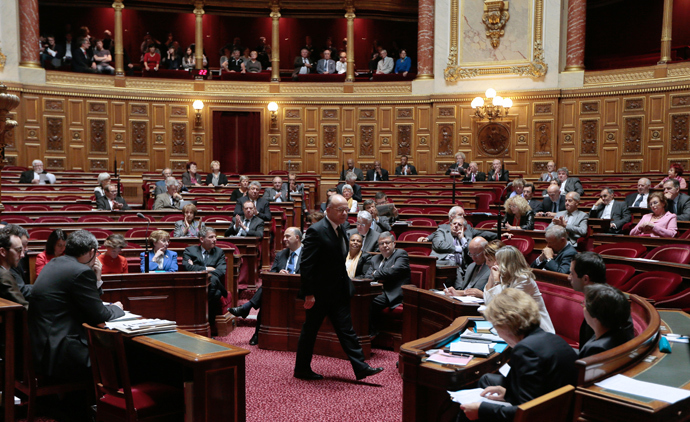‘Personal data exposé’: Outcry in France against new i-snooping law

Outraged opponents of the new law allowing French intelligence and the government to spy on internet users without any authorization, say it will "weaken the country's position" in the European and international debate on protection of personal data.
The law, which was passed on Wednesday, will enable public officials – from local gendarmes and anti-terrorist agencies to tax authorities – to request connection data transmitted in real time, including location information from cell phones.
Until now, demands for data interception had to be authorized by a judge of the National Commission for the Control of Security Intercepts.
However, from now on Article 13 of the new law allows intelligence services from the state's defense, interior, economy, tax and finance ministries to find out just about anything about any individual without authorization from a judge.
164 voted for the controversial law and 146 against in the French Senate. An amendment rejecting Article 13, tabled by activists from the Green Party, was thrown out.

Opponents are considering whether to refer the legislation to the constitutional court, France's highest legal authority, over the question of public freedom. But to get the law reviewed by the court, at least 60 senators and deputies should back the motion.
The Green Party, which has 27 members of parliament, said it is ready to join any group of deputies, regardless of party affiliation, to challenge the law's constitutionality.
"Doubts persist over the law, so it would be preferable that the Constitutional Court rules on whether it conforms to the principles of individual freedom guaranteed by the constitution," the Greens said in a statement.
Technology firms from the Association of Internet Services Communities (@SIC), including Microsoft, Google, Facebook, Skype and AOL, also said they "regretted the adoption of the new law".
@SIC said that focusing on the issue of detailed invoices and geolocation, the "senators have forgotten that this text does not only apply to telecom operators, but to all internet intermediaries." As a result, @SIC said, "France has raised a number of concerns over protection of freedoms".
"There is no doubt this text will weaken the French position in the European and international debate on the protection of personal data," @SIC warned.

The passing of the new legislation came as a surprise to many, given that less than two months ago, during a phone conversation with Barack Obama, François Holland expressed his "deep disapproval" at revelations that the NSA had been intercepting millions of phone calls in France. The French president described it as an "unacceptable practice".
Government officials argue that the new measure is a vital tool against global terrorism, organized crime and economic espionage to protect national security. The defense minister, Jean-Yves Le Drian, maintains that "public liberties will be covered", maintaining the operational effectiveness of the new law.
The government says the spying will be overseen by an independent authority and by parliament.
However, the French Association of Software and Internet Solutions Editors (AFDEL), which represents 350 French software and internet companies, warned the new law may fuel the movement of citizen distrust towards technologies and Cloud computing solutions.
"This text may indeed represent a negative signal to the protection of personal data and come to offset the ongoing negotiations on the European level, aimed precisely to strengthen the legal framework of the protection of personal data," AFDEL said.
AFDEL President, Jamal Labed, said that in its current form the initiative is at odds with the objective of making the European space a zone of enhanced law for data protection.














